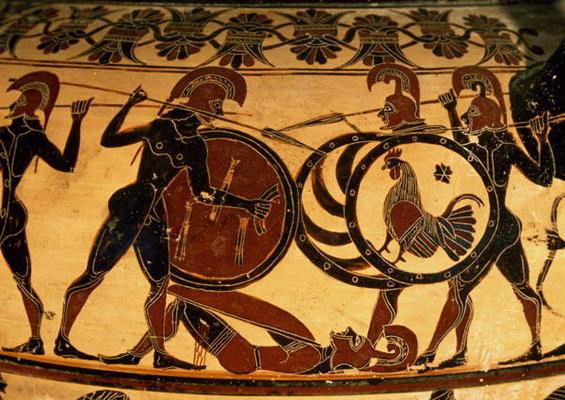Eventlist
Εκδήλωση

- Τίτλος:
- Open Seminar: Fate, Pre-Destination and the Mindset of Ancient and Modern Warriors
- Πότε:
- 09.07.2015 19.00 h
- Που:
- Greek Centre Melbourne (Mezzanine) - Melbourne
- Κατηγορία:
- Εκπαίδευση
Περιγραφή
Lecturer: Christopher Matthew
Entry: Free
Synopsis
Western military tradition begins with the ancient Greeks. Within the writings of the Greeks are found some of the first recorded instances of physical and psychological reactions to the traumas of war. One soldier at the battle of Marathon in 490BC, for example, seems to have suffered the first recorded instance of a condition known as hysterical blindness – a condition where an individual experiences such a heightened state of fear that the brain actually severs their visual input. The ancient Greeks were also one of the first cultures in human history to try to understand the impact of conflict on both combatant and civilian and to write about these observations.
Yet despite this long span of precedent, how the warriors of both the ancient Greek world and those of modern societies have faced and dealt with these terrors is vastly different. Modern warfare, for example, is fought over a distance of many metres or more were a combatant is either firing his weapon at a vague shape in the distance or may even be calling is fire-support (artillery, air strikes etc) on a target he cannot even see. For the Greeks on the other hand, combat was a much more personal experience – where the enemy was generally no more than two metres away and all of the killing was delivered with hand held weapons.
And yet, despite the ancient Greek references to the physical and mental reactions to war, the ancient Greek warrior seems to have been much better conditioned to engage in a savage style of fighting which would seem totally foreign in the modern era. Some (controversial) modern studies conducted by the US army at the end of World War II suggested that in some cases only 15% of the members of a unit fired their weapons at an enemy. However, for the ancient Greek warrior in the massed formation of the phalanx, and with an opposing formation directly in front of him, avoiding combat was not an option. The ancient Greek warrior had little choice but to stand his ground and engage in this very intimate form of killing.
Both the ancient warrior and his modern counterpart have used a number of different methods to prepare for, participate in, and ultimately understand the seemingly randomness of war. This is, in part, due to the nature of many of the different religious and socio-political parameters found within the cultures of these two time periods. This presentation will discuss one of the main contributors which has helped both modern and ancient warriors cope with the terrors of war – the concept of Fate and a belief in pre-destination.
Bio
Christopher Matthew is an internationally recognised specialist in ancient warfare. He graduated with first class honours from the University of New England before moving to Macquarie University to undertake a PhD using physical re-creation, experimental archaeology and ballistics testing to examine the mechanics of warfare in ancient Greece.
Chris’ research interests have resulted in numerous published articles in peer reviewed journals and several books. Chris has also been engaged as a historical consultant for film and documentary projects and for museum exhibitions. In 2015 Chris was awarded the position of Honorary Associate with Macquarie University due to the excellence of his research. Chris is currently a lecturer of ancient history at the Australian Catholic University in Sydney.
Sponsors
During the course of the year considerable expenses are incurred in staging the seminars. In order to mitigate these costs individuals or organisations are invited to sponsor a lecture of their choice, please email: Αυτή η διεύθυνση ηλεκτρονικού ταχυδρομείου προστατεύεται από κακόβουλη χρήση. Χρειάζεται να ενεργοποιήσετε την Javascript για να τη δείτε.
This seminar has been sponsored by: Nick Koukouvitakis and Ancient Hoplitikon of Melbourne Inc.
You too can sponsor one or more seminars and (optionally) let your name or brand be known as a patron of culture to our members, visitors and followers, as well as the broader artistic and cultural community of Melbourne.
We also thank the seminars' corporate sponsors:
Τόπος διεξαγωγής
- Venue:
- Greek Centre Melbourne (Mezzanine) - Διαδικτυακός τόπος
- Οδός:
- 168 Lonsdale Street
- ΤΚ:
- 3000
- Πόλη:
- Melbourne
- Νομός:
- VIC
- Χώρα:
-

The Mezzanine floor (press "M" in the elevator) of Greek Centre Melbourne - located at the corner of Lonsdale and Russell streets in Melbourne, Australia.
EventList powered by schlu.net

